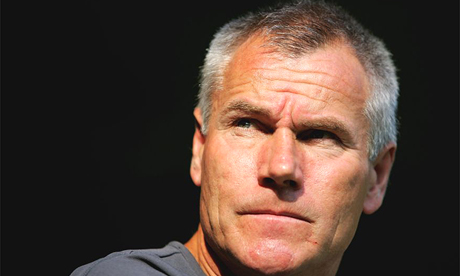
There was a time when Newcastle United players harboured mixed feelings about being called up for their various international sides. "Kevin Keegan knew the sultan of Brunei and, during the 1990s, he sometimes used to take those left behind at St James' Park in international weeks over to Brunei for mini-breaks," explained the former England and Newcastle midfielder Rob Lee. "Some of us visiting less exotic places with our countries were a little bit jealous."
Unfortunately for Sunderland's players Ricky Sbragia seems less well-connected. Indeed rather than travel to the tropics, Sbragia's non-internationals are spending this week at their "Academy of Light" practice base in Cleadon. With nine first-teamers at his disposal and relegation to be avoided, Sbragia has organised five intensive daily training sessions ahead of a free weekend.
The resultant work on shape, shadow play and set pieces may yet afford them an advantage when the Premier League resumes a week on Saturday but some managers feel such diligence can prove wasted energy when players are becoming jaded and battle fatigued.
"Personally, if I were still in the Premier League, I'd probably give my non-international players a good few days off this week," said Peter Taylor, the Wycombe manager who was formerly in charge of Leicester City and also coached the England Under-21s. "I wouldn't do it before Christmas but, by now, players are tired and sometimes getting a bit bored of each other so a break does them a power of good. I'd tell them to go off and do their own thing."
Moreover Taylor also supports those expensively tanned Premier League managers who quietly slip out of the country with their wives for private foreign breaks, typically in destinations such as Dubai, South Africa, Spain and Portugal. "By now managers also need their batteries recharging and, with eight games to go to avoid relegation or qualify for Europe, getting away by themselves can put them in the right frame of mind to make the big decisions which can be vital to their team's future," he said.
"Managing in the bottom half of the Premier League is like going several rounds with Mike Tyson every game, the pressure is that great, so a few days away from it all in the sun can make you much more effective."
Taylor, though, does not advocate transporting non-internationals abroad. "Players have seen enough of each other and done enough physical training by late March, they've spent enough time in hotels, so something which might have bonded them earlier in the season can be counterproductive. The really important thing, particularly if you're fighting relegation and the atmosphere is tense, is to get people out of the building and give them a change of scene."
While some fans fear international duty merely drains club stars and detracts from their day jobs, Taylor believes the attendant adrenaline rush can raise an individual's game. "Clearly there's always the danger of internationals getting injured and that can impact on both relegation and the title race. If Stewart Downing gets hurt with England now it could destroy Middlesbrough's season. But, hopefully, being part of the international set-up should give Stewart a boost and Gareth Southgate will benefit."
Lee accepts boredom can be an enemy of those left behind. "If you have a lot of players away on international duty, there's only so much you can do in training," he explained. "Usually you have to draft reserves into sessions. It's OK but it's not quite the same, there's not the normal intensity."
Yet sometimes less is more and doing next to nothing can provoke some dynamic performances. Lee said most players had niggling injuries and the recovery time helped non-internationals. "Because footballers are so highly paid, people often see them as machines but they are human beings who need rest. Time off with their families often works well."
Unless, of course, the manager books a trip to Brunei.

